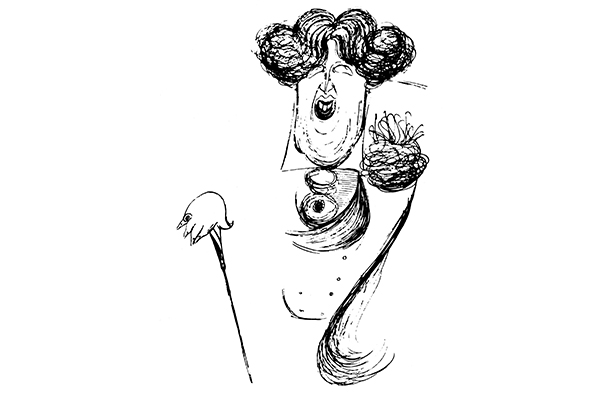In the autumn of 1897, after two years in jail on a charge of ‘gross indecency’, Oscar Wilde absconded to Italy with the deplorable Lord Alfred Douglas. Sodomy, whether with man or beast, carried a sentence of servitude for life in Victorian Britain: prigs protested that Wilde had got off lightly.
In Naples, ragamuffin capital of the Italian south, the Dublin-born outcast went to ground with Bosie in the Villa Guidice (now the Villa Bracale) at 37 Via Posillipo. Inevitably there was press intrusion. The English-language Naples Echo was quick to announce the arrival of Sebastian Melmouth: ‘Readers may know that this is the pseudonym of Oscar Wilde.’ Where to hide? To Wilde’s fury a journalist managed to inveigle his way into No 37:
Signor Wilde cast me a glacial interrogative gaze. He was a man of about forty, tall, of vigorous complexion, with clear English eyes. His splendid blond hair, brushed with care, fell about an elongated face (one of those equine faces so typical of the English). In one of the aesthete’s upper incisors a fragment of gold scintillated strangely when he spoke. He was wearing a suit of incomparably fine white English linen and a richly embroidered shirt with a vermillion cravat to match.
See Naples and dress up. A decade earlier, during his 1882 lecture tour of America, audiences had gone wild for Oscar, whose applications of rouge and dyed-green carnation buttonholes were so unlike anything worn by most cowboys. In his creatively depleted, corporeally bloated final years, however, his genius for self-promotion was of little use. Gossip-hungry Neapolitan reporters confused Bosie Douglas with Norman Douglas, the polymathic young English writer (and fellow lover of boys) who was resident nearby in Posillipo at the Villa Maya. Privacy was impossible. An aristocratic Spanish diplomat friend of Douglas’s had been mistaken for Wilde. ‘Yesterday afternoon a fattish if distinguished-looking man with flaccid cheeks [guance flaccide] was seen sitting next to Lord Douglas in a horse-drawn carriage. There can be no doubt: the English décadent Oscar Wilde is with us here in Naples.’ It was too much. Consumed by the monster of his own celebrity, Wilde threatened to blow out his brains in a ‘Neapolitan urinal’.
I suppose it does no harm to tell Wilde’s story again. Matthew Sturgis, an expert on the English Aesthetic Movement, has found more than 60 new letters by Wilde, scoured census records from Naples to San Francisco and dug out local press reports, playbills and other ephemera. Running to almost 900 pages, Sturgis’s is an old-school biography that takes us smoothly from the cradle to the crematorium. Few publishers would take on a biography of this size today. Richard Ellmann’s Oscar Wilde, published some 30 years ago, contains numerous ‘deficiencies’ of fact, however, which Sturgis has seen fit to remedy. Well-written and wholly absorbing, Oscar may be as heavy as a house brick, but it does the 6ft 4in Anglo-Irish dandy proud.
Behind the story of how Oscar became Oscar Wilde is the figure of his flamboyant mother, Lady Jane Wilde. In her self-delusion she believed that her family, the Elgees, were related to Dante’s family, the Alighieris. This was genealogical hokum, but it did not stop Lady Wilde from signing herself Speranza and claiming a Florentine ancestry to match. Her husband, Sir William Wilde, a distinguished ophthalmic surgeon, was accused in court of sexual misconduct with a woman patient. With parents like these, it is perhaps not surprising that Oscar turned out to be such a wonderfully strange, high-flavoured fruit.
Lady Wilde had hoped that her son might bring back a bride with him from his tour of America in 1882. Instead he married a pretty, grey-eyed Irish girl, Constance Lloyd, with whom he had two sons. It was often rumoured that Wilde wished to convert to Catholicism: the Roman ritual and the gorgeousness of its accoutrements certainly attracted him. However, he was less interested in conversion than in inversion — Hellenic love. Early on with Constance he was guilty of suppressio veri (concealment of the truth); outwardly a good though hardly an ideal husband, Wilde pursued what Sturgis calls a life of ‘sybaritic abandon’ in underworld London with rent boys, pimps and blackmailers, and fell madly for the voraciously promiscuous Bosie.
Wilde never expected to be readily understood. His trial in 1895 was a sex scandal that thrilled late-Victorian Britain as much as it desolated him. Sturgis portrays a man dogged in his final years by ill fortune. At the Villa Guidice a servant stole Wilde’s clothes and other belongings, including the first draft manuscript of ‘The Ballad of Reading Gaol’. The long-suffering Constance (who was to die in Genoa at the age of 40, apparently of a broken heart) continued to distance herself. Wilde could not own up to the cruelty he had inflicted upon her. In 1900, addicted to absinthe and cigarettes, he died in a Paris hotel, having at last converted to Catholicism. Matthew Sturgis’s authoritative, magnificently researched life may not be the last we hear of Oscar Wilde.






Comments